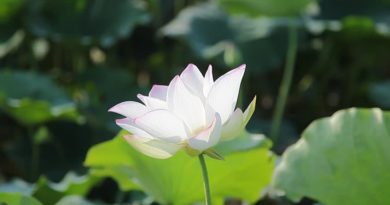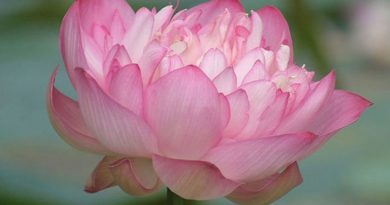Volume Iv –– Saḷāyatanavaggo Book 34 –– Saḷāyatana Saṃyutta Chapter 3 –– Sabba Vaggo
Sutta Pitaka
Samyutta Nikāya
Volume IV –– Saḷāyatanavaggo
Book 34 –– Saḷāyatana Saṃyutta
Chapter 3 –– Sabba Vaggo
34. 3. 1.
(23.) Sabba –– Everything
1. At Sāvatthi.
2. “Monks, I will teach you everything, listen to it carefully.
3. “Monks, what is everything? Eye and forms are everything. Ear and sounds, nose and scents, tongue and tastes, body and touches and mind and ideas are everything. These are called everything.
4. “Monks, if someone says I reject this everything and appoint some other everything, they are only words uttered, questioned would not be able to reply and would fall into trouble. What is the reason? It is not his sphere to reply.
34. 3. 2.
(24.) Pahāna 1 –– Dispelling 1
1. At Sāvatthi.
2. “Monks, I will teach you how to dispel everything, listen to it carefully.
3. “Monks, what is dispelling everything?
4-6. “Monks, the eye, forms, eye-consciousness, eye- contact and whatever feelings, pleasant, unpleasant or neither unpleasant nor pleasant, that arise on account of eye-contact, those too should be dispelled. Repeat for the ear and nose.
7-8. “Monks, the tongue, tastes, tongue-consciousness, tongue contact and whatever feelings, pleasant, unpleasant or neither unpleasant nor pleasant, that arise on account of tongue-contact, those too should be dispelled. Repeat for the body.
9. “Monks, the mind ideas, mind-consciousness, mind contact and whatever feelings, pleasant, unpleasant or neither unpleasant nor pleasant, that arise on account of mind-contact, those too should be dispelled.
10. “Monks, this is the method for dispelling everything.”
35.3. 3.
(25.) Pahāna 2 –– Dispelling 2
1. At Sāvatthi.
2. “Monks, I will teach you thorough knowledge, its comprehension and how to dispel everything, listen to it carefully.
3. “Monks, what is thorough knowledge, its comprehension and how is dispelling everything?
4-6. “Monks, the eye should be thoroughly known, comprehended and dispelled, forms, eye-consciousness, eye contact and whatever feelings, pleasant, unpleasant or neither unpleasant nor pleasant, that arise on account of eye-contact, those too should be thoroughly known, comprehended and dispelled Repeat for the ear and nose.
7-8. “Monks, the tongue, tastes, tongue-consciousness, tongue contact and whatever feelings, pleasant, unpleasant or neither unpleasant nor pleasant, that arise on account of tongue-contact, those too should be thoroughly known, comprehended and dispelled. Repeat for the body.
9. “Monks, the mind, ideas, mind-consciousness, mind contact and whatever feelings, pleasant, unpleasant or neither unpleasant nor pleasant, that arise on account of mind-contact those too should be thoroughly known comprehended and dispelled.
10. “Monks, this is the method for thorough knowledge comprehension and dispelling everything.”
34. 3. 4.
(26.) Aparijāna 1 –– Knowing Accurately 1
1. At Sāvatthi.
2. “Monks, without recollecting accurate knowledge, without missing and dispelling everything, it is not possible to destroy unpleasantness.
3. “Monks, without recollecting accurate knowledge, without missing and dispelling what, is it not possible to destroy unpleasantness?
4-6. “Monks, without recollecting, accurate knowledge, without missing and dispelling the eye, forms, eye-consciousness, eye-contact and all feelings pleasant, unpleasant or neither unpleasant nor pleasant born of eye contact it is not possible to destroy unpleasantness. Repeat for the ear and nose.
7-8. “Monks, without recollecting, accurate knowledge, without missing and dispelling the tongue, tastes, tongue-consciousness, tongue contact and all feelings pleasant, unpleasant or neither unpleasant nor pleasant born of tongue contact it is not possible to destroy unpleasantness. Repeat for the body.
9. “Monks, without recollecting, accurate knowledge, without missing and dispelling the mind, ideas, mind-consciousness, mind-contact and all feelings pleasant unpleasant or neither unpleasant nor pleasant born from mind contact, it is not possible to destroy unpleasantness.
10. “Monks, without recollecting, without accurate knowledge, without missing and dispelling all these it is not possible to destroy unpleasantness.
11. “Monks, recollecting accurate knowledge, missing and dispelling all these things, it is possible to destroy unpleasantness.
12. “Monks, recollecting accurate knowledge, missing and dispelling what is it possible to destroy unpleasantness.
13-15. “Monks, recollecting accurate knowledge, missing and dispelling the eye, forms, eye-consciousness eye-contact and whatever feelings pleasant unpleasant or neither unpleasant nor pleasant born of eye contact it is possible to destroy unpleasantness Repeat for the ear and nose.
16-17. “Monks, recollecting accurate knowledge, missing and dispelling the tongue, tastes, tongue-consciousness, tongue contact and whatever feelings pleasant unpleasant or neither unpleasant nor pleasant born of tongue contact it is possible to destroy unpleasantness Repeat for the body.
18. “Monks, recollecting accurate knowledge, missing and dispelling the mind, ideas, mind-consciousness, mind-contact it is possible to destroy unpleasantness and whatever feelings pleasant unpleasant or neither unpleasant nor pleasant born of mind contact it is possible to destroy unpleasantness.
19. “Monks, recollecting accurate knowledge, missing and dispelling all these it is possible to destroy unpleasantness.”
34. 3. 5.
(27.) Aparijāna 2 –– Knowing Accurately 2
1. At Sāvatthi.
2. “Monks, without recollecting accurate knowledge, missing and dispelling everything, it is not possible to destroy unpleasantness.
3. “Monks, without recollecting accurate knowledge, missing and dispelling what, is it not possible to destroy unpleasantness?
4-6. “Monks, without recollecting, accurate knowledge, missing and dispelling the eye, forms, eye-consciousness and whatever cognized by eye-consciousness it is not possible to destroy unpleasantness. Repeat for the ear and nose.
7-8. “Monks, without recollecting, accurate knowledge, missing and dispelling the tongue, tastes, tongue-consciousness and whatever cognized by tongue-consciousness it is not possible to destroy unpleasantness. Repeat for the body.
9. “Monks, without recollecting, accurate knowledge, missing and dispelling the mind, ideas, mind-consciousness, and whatever cognized by mind-consciousness, it is not possible to destroy unpleasantness.
10. “Monks, without recollecting, accurate knowledge, missing and dispelling all these it is not possible to destroy unpleasantness.
11. “Monks, recollecting accurate knowledge, missing and dispelling all these things, it is possible to destroy unpleasantness.
12. “Monks, recollecting accurate knowledge, missing and dispelling what, is it possible to destroy unpleasantness?
13-15. “Monks, recollecting accurate knowledge, missing and dispelling the eye, forms, eye-consciousness and whatever cognized by eye-consciousness, it is possible to destroy unpleasantness. Repeat for the ear and nose.
16-17. “Monks, recollecting accurate knowledge, missing and dispelling the tongue, tastes, tongue-consciousness and whatever cognized by tongue consciousness, it is possible to destroy unpleasantness Repeat for the body.
18. “Monks, recollecting accurate knowledge, missing and dispelling the mind, ideas, mind-consciousness and whatever cognized by mind consciousness, it is possible to destroy unpleasantness.
19. “Monks, recollecting accurate knowledge, missing and dispelling all these it is possible to destroy unpleasantness.”
34. 3. 6.
(28.) Ādittaṃ –– Burning
1. At one time the Blessed One lived at the source of river Ganges with a large Community of monks.
2. The Blessed One addressed the monks from there: “Monks, everything is burning. Monks, what is burning?
3-5. “Monks, the eye, forms, eye-consciousness, eye-contact and whatever feelings, pleasant unpleasant or neither unpleasant nor pleasant born of eye-contact, that too is burning. Burning how? Burning on account of, greed, hate, delusion, birth, decay, death, grief, lament, unpleasantness, displeasure and distress. I say it is burning. Repeat for the ear and nose.
6-7. “Monks, the tongue, tastes, tongue-consciousness, tongue-contact and whatever feelings, pleasant unpleasant or neither unpleasant nor pleasant born of tongue-contact, that too is burning. Burning how? Burning on account of, greed, hate, delusion, birth, decay, death, grief, lament, unpleasantness, displeasure and distress. I say it’s burning. Repeat for the body.
8. “Monks, the mind, ideas, mind-consciousness, mind-contact and whatever feelings, pleasant unpleasant or neither unpleasant nor pleasant born of mind-contact, that too is burning. Burning how? Burning on account of, greed, hate, delusion, birth, decay, death, grief, lament, unpleasantness, displeasure and distress. I say it’s burning.
9. “Monks, the learned, noble disciple seeing it thus turns from the eye and forms, eye-consciousness, eye-contact and whatever feelings, pleasant unpleasant or neither unpleasant nor pleasant born of eye-contact, he turns from that too re He turns from the mind, deas, mind-consciousness, mind-contact and whatever feelings, pleasant unpleasant or neither unpleasant nor pleasant born of mind-contact, he turns from that too. Turning loses interest. Losing interest is released. Released knowledge arises to him, I am released, birth is destroyed, the holy life is lived to the end, duties are done, I have nothing more to wish.”
10. The Blessed One said thus and those monks delighted in the words of the Blessed One.
11. When this exposition was done about a thousand monks released their minds from desires without anything remaining.
34. 3. 7.
(29.) Andhabhutaṃ –– Blindfolded
1. I heard thus. At one time the Blessed One lived in the squirrels’ sanctuary in the bamboo grove in Rajagaha.
2. The Blessed One addressed the monks from there: “Monks, everything is blindfolded. Monks, what is blindfolded?
3-5. “Monks, the eye, forms, eye-consciousness, eye-contact and whatever feelings, pleasant unpleasant or neither unpleasant nor pleasant born of eye-contact, that too is blindfolded. Blindfolded by what? Blindfolded by, greed, hate, delusion, birth, decay, death, grief, lament, unpleasantness, displeasure and distress. I say it is blindfolded. Repeat for the ear and nose.
6-7. “Monks, the tongue, tastes, tongue-consciousness, tongue-contact and whatever feelings, pleasant unpleasant or neither unpleasant nor pleasant born of tongue-contact, that too is blindfolded. Blindfolded by what? Blindfolded by, greed, hate, delusion, birth, decay, death, grief, lament, unpleasantness, displeasure and distress. I say it’s blindfolded. Repeat for the body.
8. “Monks, the mind, ideas, mind-consciousness, mind-contact and whatever feelings, pleasant unpleasant or neither unpleasant nor pleasant born of mind-contact, that too is blindfolded. Blindfolded by what? Blindfolded by, greed, hate, delusion, birth, decay, death, grief, lament, unpleasantness, displeasure and distress. I say it’s blindfolded.
9. “Monks, the learned, noble disciple seeing it thus turns from the eye and forms, eye-consciousness, eye-contact and whatever feelings, pleasant unpleasant or neither unpleasant nor pleasant born of eye-contact, he turns from that too re He turns from the mind and ideas, mind-consciousness, mind-contact and whatever feelings, pleasant unpleasant or neither unpleasant nor pleasant born of mind-contact, he turns from them too. Turning loses interest. Loosing interest is released. Released knowledge arises to him, I am released, birth is destroyed, the holy life is lived to the end, duties are done, I have nothing more to wish.”
34. 3. 8.
(30) Saruppa-Proper
1. I heard thus. At one time the Blessed One lived in the squirrels’ sanctuary in the bamboo grove in Rajagaha.
2. “Monks, I will tell you the proper dispelling of all mental ramblings, listen to it carefully.
3. “Monks, what is the method for the proper dispelling of all mental ramblings?
4-6. “Here, monks, the monk does not think it’s, the eye, it’s through and from the eye or it’s mine. He does not think it’s a form, it’s through or from forms, or it’s mine. He does not think it’s eye-consciousness, it’s through and from eye-consciousness, or it’s mine. He does not think it’s eye-contact, it’s through and from eye-contact or it’s mine and he does not think it is through and from whatever feelings, pleasant unpleasant or neither unpleasant nor pleasant born of eye-contact, or they are mine. Repeat for the ear and nose.
7-8. “Monks, the monk does not think it’s, the tongue, it’s through and from the tongue or it’s mine. He does not think it’s a taste, it’s through and from tastes or it’s mine. He does not think it’s tongue-consciousness, it’s through and from tongue-consciousness or it’s mine. He does not think it’s tongue-contact, it’s through and from tongue-contact or it’s mine and he does not think it is through and from feelings, pleasant unpleasant or neither unpleasant nor pleasant born of tongue contact and he does not think they are mine. Repeat for the body.
9. “Monks, the monk does not think it’s, the mind, it’s through or from the mind or it’s mine. He does not think it’s an idea, it’s through and from ideas or it’s mine. He does not think it’s mind-consciousness, it’s through and from mind-consciousness or it’s mine. He does not think it’s mind-contact, it’s through or from mind-contact or it’s mine and he does not think it’s through and from whatever feelings, pleasant unpleasant or neither unpleasant nor pleasant born of mind-contact, and he does not think they are mine.
10. “Monks, he does not think of all, does not think through and from all and he does not think all is mine.
11. “Not thinking he does not hold to anything in the world and not worried about that, is appeased from within. He knows, birth is destroyed, the holy life is lived to the end, duties are done, I have nothing more to wish”
12. “Monks, this is the method for the proper dispelling of all mental ramblings.”
34. 3. 9.
(31) Sappāya1-The Suitable 1
1. I heard thus. At one time the Blessed One lived in the squirrels’ sanctuary in the bamboo grove in Rajagaha.
2. “Monks, I will tell you the suitable dispelling of all mental ramblings, listen to it carefully.
3. “Monks, what is the method for the suitable dispelling of all mental ramblings?
4-6. “Here, monks, the monk does not think it’s, the eye, it’s through or from the eye or it’s mine. He does not think it’s a form, it’s through or from forms, or it’s mine. He does not think it’s eye-consciousness, it’s through or from eye-consciousness or it’s mine. He does not think it’s eye-contact, it’s through or from eye-contact or it’s mine and he does not think it is through or from whatever feelings, pleasant unpleasant or neither unpleasant nor pleasant, born of eye-contact. He does not think through or from them or think they are mine. Monks, whatever he may think, through or from or think is min it turns to be not relevant. The thinking person delights in the world, by only thinking. Repeat for ear and nose.
7-8. “Monks, the monk does not think it’s, the tongue, it’s through and from the tongue or it’s mine. He does not think it’s a taste, it’s through or from tastes or it’s mine. He does not think it’s tongue-consciousness, it’s through or from tongue-consciousness or it’s mine. He does not think it’s tongue-contact, or it’s through or from tongue-contact or it’s mine and he does not think it is through or from whatever feelings, pleasant unpleasant or neither unpleasant nor pleasant born of tongue-contact or they are mine. Monks, whatever he thinks, through or from turns to be not relevant. The thinking person delights in the world only by thinking. Repeat for the body.
9. “Monks, the monk does not think it’s, the mind, it’s through or from the mind or it’s mine. He does not think it’s an idea, it’s through and from ideas or it’s mine. He does not think it’s mind-consciousness, it’s through or from mind-consciousness or it’s mine. He does not think it’s mind-contact, it’s through or from mind-contact or it’s mine or it is through or from whatever feelings, pleasant unpleasant or neither unpleasant nor pleasant born of mind-contact, or they are mine. Monks, whatever he thinks, through or from that turns to be not relevant. The thinking person delights in the world only by thinking.
10. “Monks, he does not think even of the masses, elements and the mental spheres. He does not think through or from them and he does not think they are mine Not thinking, he does not hold to anything in the world and not worried about that, is appeased from within. He knows, birth is destroyed, the holy life is lived to the end, duties are done, I have nothing more to wish”
11. “Monks, this is the method for the suitable dispelling of all mental ramblings.”
34. 3. 10.
(32) Sappāya 2 –– The Suitable 2
1. I heard thus. At one time the Blessed One lived in the squirrels’ sanctuary in the bamboo grove in Rajagaha.
2. “Monks, I will tell you the suitable dispelling of all mental ramblings, listen to it carefully.
3. “Monks, what is the method for the suitable dispelling of all mental ramblings?
4-6. “Monks, is the eye permanent or impermanent?”
“Venerable sir, it is impermanent.”
“That impermanent thing is it unpleasant or pleasant?”
“Venerable sir, it is unpleasant.”
“That impermanent, unpleasant, changing thing is it suitable to be considered, it is mine, I am that. It’s my self?”
“That is not so, venerable sir.”
“Are forms re eye-consciousness re eye-contact permanent or impermanent?”
“Venerable sir, they are impermanent.”
“Those impermanent things are they unpleasant or pleasant?”
“Venerable sir, they are unpleasant.”
“Those impermanent, unpleasant, changing things are they suitable to be considered, they are mine, I am there, they are my self?”
“That is not so, venerable sir.”
Repeat for ear and nose.
7-8. “Monks, is the tongue permanent or impermanent?”
“Venerable sir, it is impermanent.”
“That impermanent thing is it unpleasant or pleasant?”
“Venerable sir, it is unpleasant”
“That impermanent, unpleasant, changing thing is it suitable to be considered, it is mine, I am that. It’s my self?”
“That is not so, venerable sir.”
“Are tastes re tongue-consciousness re tongue-contact permanent or impermanent?”
“Venerable sir, they are impermanent.”
“Those impermanent things are they unpleasant or pleasant?”
“Venerable sir, they are unpleasant.”
“Those impermanent, unpleasant, changing things are they suitable to be considered, they are mine, I am there, they are my self?”
“That is not so, venerable sir.”
Repeat for the body.
9. “Monks, is the mind permanent or impermanent?”
“Venerable sir, it is impermanent.”
“That impermanent thing is it unpleasant or pleasant?”
“Venerable sir, it is unpleasant.”
“That impermanent, unpleasant, changing thing is it suitable to be considered, it is mine, I am that. It’s my self?”
“That is not so, venerable sir.”
“Are ideas re mind-consciousness re mind-contact permanent or impermanent?”
“Venerable sir, they are impermanent.”
“Those impermanent things are they unpleasant or pleasant?”
“Venerable sir, they are unpleasant.”
“Those impermanent, unpleasant, changing things are they suitable to be considered, they are mine, I am there, they are my self?”
“That is not so, venerable sir.”
10. “Monks, the learned, noble disciple seeing it thus turns from the eye and forms, eye-consciousness, eye-contact and whatever feelings, pleasant unpleasant or neither unpleasant nor pleasant born of eye-contact, he turns from them too re
“He turns from the tongue and tastes, tongue-consciousness, tongue-contact and whatever feelings, pleasant unpleasant or neither unpleasant nor pleasant born of tongue-contact, he turns from them too re .He turns from the mind and ideas, mind-consciousness, mind-contact and whatever feelings, pleasant unpleasant or neither unpleasant nor pleasant born of mind-contact, he turns from them too. Turning loses interest. Losing interest is released. Released knowledge arises to him, I am released, birth is destroyed, the holy life is lived to the end, duties are done, I have nothing more to wish”.
11. “Monks, this is the suitable method for dispelling all mental ramblings.”







